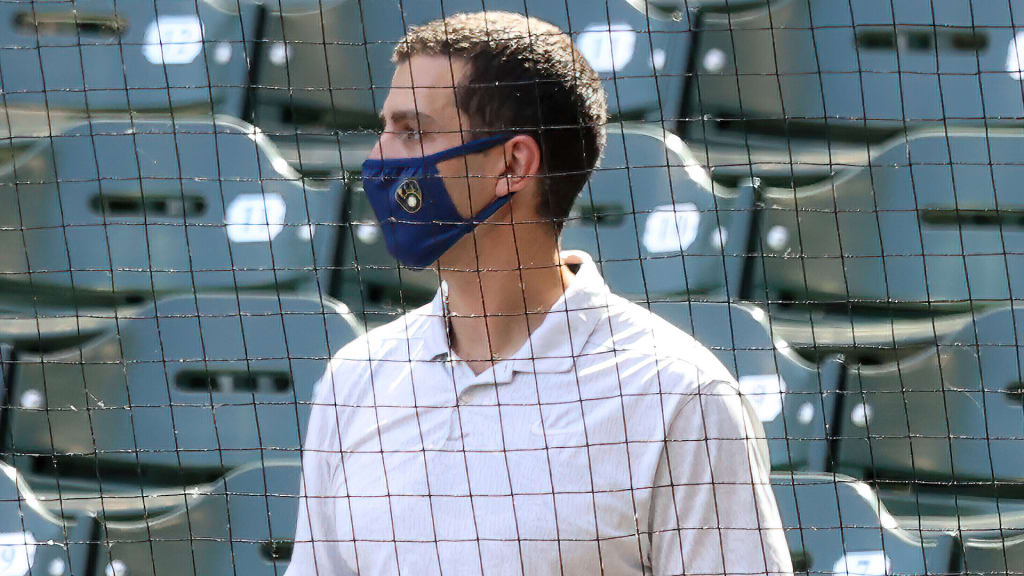
MILWAUKEE -- After an abrupt departure from American Family Fields of Phoenix last March, when baseball was paused due to the coronavirus pandemic, David Stearns and the Brewers are back.
Stearns, the Brewers’ president of baseball operations, heads a group of officials intent on keeping things on schedule. That effort formally begins on Thursday, when, after completing intake testing and physical exams, pitchers and catchers are scheduled to be on the field for their first organized workout of the year. Position players join next week for the first full-squad workout on Feb. 23.
Among them will be Christian Yelich and Lorenzo Cain, the former aiming to regain his MVP form and the latter returning from a season away from the sport. New second baseman Kolten Wong will get to know his teammates, including Keston Hiura, who will get to know first base. Not on hand will be third baseman Justin Turner, who re-signed with the Dodgers over the weekend after receiving a multiyear offer from the Brewers that might not have quite matched the terms he reportedly received from L.A. but came close.
One of the tasks facing the Brewers in the coming weeks is deciding on their options for third base, be they internal or external. At the same time, everyone will follow strict protocols to prevent the spread of COVID-19.
Stearns spoke to MLB.com on Monday night about what lies ahead.
MLB.com: How will this Spring Training camp look different from past camps?
Stearns: We're still working through the particulars of exactly how this camp will look. Clearly, we have protocols that we have to implement that are intended to keep everyone safe and healthy, and that clearly is our first priority. We also have to get our work in, and we have to get the guys ready for the season, and we have to build a culture that will sustain us through a six-month marathon. We have to do all those things within the constructs of the health and safety protocols. So we're still working through exactly what that's going to look like.
Structurally, there are going to be differences in terms of where guys can be, how many guys can be [in one place] at one time. We're going to try to be as much outdoors as we possibly can. The good news is that the vast majority of the people who are going to be in camp went through this last year and understand many of the procedures that are going to be in place.
MLB.com: It's a 75-man player pool this year, correct? Is that group set?
Stearns: It's still in a little bit of flux. The way we will do it is, we'll have a certain number of players in Major League camp, which we've announced, then we will have players who are part of a Minor League early camp who will be in the complex as well and count against the 75, but will not technically be in Major League camp. Because of the intake protocols and testing protocols, everyone will be there from the beginning. I think it's probably going to be somewhere around 57, 58 in big league camp, another 12 or 13 early camp guys, and five or so rehabbers.
A difference this year is you can remove players from your 75-man player pool without actually losing the player. We don't have to release a player if we need to make room. We do have to get them out of the building. We can't have more than 75 players having access to the building, but we don't need to release the player.
MLB.com: That leads to another question. In your mind, are the rules of 2021 set, or do you anticipate that they are going to change?
Stearns: You never really know. Right now we are planning for the rules that are currently in place, which is no DH, no expanded playoffs, etc. And that's what we have to plan for. We also understand that things can and often do change, and we have to be prepared for that as well. I think we have to prepare for all scenarios. I’ve said this before, but if we're not comfortable with uncertainty at this point, that's on us. If we're not capable of preparing for uncertainty, that's on us.
MLB.com: What is the biggest question you need answered about your team in Spring Training?
Stearns: I think overall, we look at some of the players who, particularly on the offensive side of the ball, just had tough years last year. And I think we'd like to see those guys in camp feel good, be healthy, get into their routines and establish themselves in a good spot heading into the regular season. That doesn't necessarily mean they need to perform in Spring Training. Oftentimes, Spring Training performance does not really indicate a whole lot. But you would like them feeling good physically, feeling healthy, seeing the ball well. If we can establish that and maybe answer those questions, I think we'll all feel pretty good.
MLB.com: In other words, it sounds as if you're more focused on your core returning players than answering any question about position X or position Y, or solving a roster crunch.
Stearns: That type of stuff generally takes care of itself. I know it's kind of cliche to say that, but I think back over my first five Spring Trainings here, and the actual roster decisions that we have to make are pretty few and far between, because generally over the course of the spring, it takes care of itself whether it's via performance, via roster status, via injury or what have you. Generally, those types of decisions -- not always, but generally -- take care of themselves.
MLB.com: Now that the player himself has announced he's signing with the Dodgers, how close were you on Justin Turner?
Stearns: I hesitate to get into too many specifics about any particular negotiation. Clearly, it was well-reported we had interest, and I think that's understandable given the caliber of player Justin is. It's always tough to know how close you are to any transaction that ultimately isn't consummated. And I think that's true on this one. But yeah, Justin's a really good player, I have no doubt that he's going to continue to perform well, and we certainly wish him well,
MLB.com: For a long time here, David, it would happen again and again that you felt like a free agent would want a team like the Brewers interested in order to drive up the salary he would get from where he really wanted to go. Do you think that maybe happened here?
Stearns: No, I really haven't gotten that sense in any negotiation since I've been here. I think when players have expressed interest in our organization, it's been genuine. I think we've developed a reputation around the league where we're a desirable destination. So I have not felt that, really, in any negotiation since I have been here.
MLB.com: Does the fact that you got pretty far down the road with a significant free agent mean that you have money to spend before Opening Day?
Stearns: I think each investment decision we look at individually, and we continue to stay in regular contact with our ownership group discussing available possibilities and alternatives. And if the right opportunity presents itself, I'm certain [Brewers principal owner] Mark [Attanasio] and the rest of his group will be supportive as they always have been
MLB.com: Are there still good players at third base on the open market, should you choose to go that way?
Stearns: I think that there are certainly options out there. And I think we've talked about this before, we've got players in house who we believe in. All these guys are here for a reason, and some of them have performed at the Major League level, some of them have taken steps forward recently, and some of them are still finding themselves at the Major League level, but we believe are really talented. We're going to continue to explore outside possibilities, but we do have confidence in the group that's here right now.
MLB.com: Last year you all got through three weeks of summer camp, a 60-game regular season and a couple of playoff games successfully during the pandemic. How different is the challenge of six weeks of Spring Training and 162 games?
Stearns: That's very different. You're right, last year was a much more compressed timeframe. This is extended. This is a different challenge. And I think we need to do everything we can -- everyone involved needs to do everything we can -- to make it successful. I think in many ways, many of us are looking forward to that effort. This is ultimately what we do, what we love to do. We love the game. We love baseball. I think all of us missed the marathon 162 games. That's one of the things we love about this sport and what we do. And now hopefully we get to experience it again. We know it's not going to be easy, but we certainly owe it to everyone to give our best effort.



